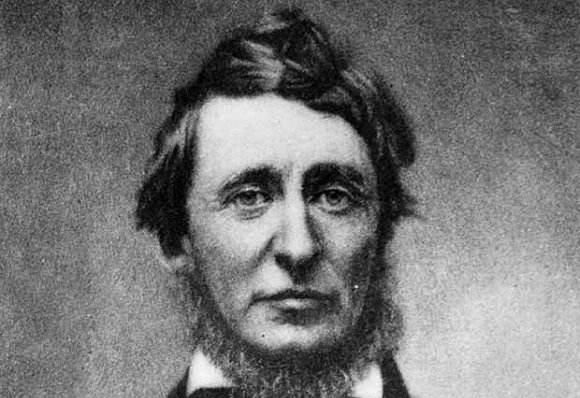Henry David Thoreau
Henry David Thoreau is a representative of American critical realism literature, the representative work "Walden". Thoreau mainly focused on criticizing the proliferation of commercialism and materialism in the society of the time, arguing that people were addicted to the pursuit of materials, but instead made themselves under the control of materials to live.

Walden
"Nature is a sea of stored forms that are extremely similar, even consistent. A leaf, a ray of sunshine, a landscape, an ocean, they leave an impression almost similar in people's minds. What all these things have in common is that the kind of completeness and harmony that is beautiful. ”
"Walden" contains 18 essays, mainly Thoreau lived in his own hut by Walden Lake from 1845 to 1847, deeply observing the lake, mountains, insects, fish, birds and beasts in different seasons, and his feelings and reflections on the life of more than two years of seclusion.
At Walden, Thoreau lived a simple life, spending less than three dollars a week on the simplest living expenses. When the sun rises by the lake every day, he can look out at the lake, enjoy the comfort of the sun, walk through the woods, breathe fresh air, read his favorite books, live very relaxed, and his body and mind are very healthy. As the saying goes, the more desires you have, the more tired you get to live. If desires are not satisfied, life is tired of desires.
Thoreau uses simple childlike words to describe the most common sunlight in nature, and in Thoreau's view, nature is pure like a child, without the slightest deception. The reason why the natural scenery makes Thoreau yearn for it is precisely because of that irreplaceable purity, which is also not found in modern cities.
In Thoreau's article, the nature that people feel is always warm and sincere, with good greetings to people's side, full of vitality like a long foot extended to the window of the forest wooden house, where there are lush trees and vines, as well as wild yellow oak trees and blackberries; the tall pines are not weak, they are next to each other, breathing in the breath of nature, the ground is the intertwined root system, every morning you can hear the greetings of nature, this romantic and rustic beauty makes Thoreau's life also beautiful Every sentence he wrote exuded sincere emotion.
Story backdrop
"A place that can make us suddenly realize, as if we have been reborn, can always bring us indescribable joy. In most cases, what we are busy with is nothing more than superficial and short-lived things that actually distract us. The closest thing to all things is the power that makes them exist, and closest to us are the greatest laws that are always at work. What comes close to us is not the craftsman we paid for, not the craftsman with whom we like to talk, but the craftsman who made us. - Walden
In the 1850s, on the eve of the outbreak of the American Civil War, on the eve of large-scale industrialization, urbanization, and modernization in the United States, a drastic social transformation was coming. A materialistic, money-first society is coming.
Before the social transformation, various currents of thought surged and capitalist lifestyles began to penetrate, and the supremacy of money, materialism, and economic success have become increasingly pursued goals.
The concept of the supremacy of economic interests dominates, and people use money as a criterion for measuring the value of life, which makes people overly dependent on material wealth in the pursuit of material interests and social problems.
"Barbarians have pointed houses, yet in modern civilized society only half of families have houses. In large cities where civilization is particularly developed, the number of people who own houses is only a very small number. ”
One of the manifestations of excessive material pursuit is that when material needs are satisfied, desires are still not satisfied, so people are never free. After having his own house, he was still disappointed that the house could not avoid bad neighbors; after having clothes made by tailors to replace hats made of palm leaf or groundhog skin, he was still sad because he could not afford a crown.
After experiencing the rapid progression of the large-scale industrial age, when many of the pictures that once existed only in fantasy were realized one by one, modern people gradually found that the unlimited expansion and expansion of desire, the endless pursuit of materials, did not add more happiness and satisfaction, but on the contrary, it was confusing and frightening.
Industrialization has also brought about the alienation of human labor, and the specific manifestations of alienated labor are: first, the alienation of laborers from their own labor products, second, alienation of laborers from their own labor behavior, third, alienation of laborers from their own class essence, and fourth, alienation of people from people.
When there is alienation between man and the product of labor he produces, the product of labor, far from being able to embody the value of man, becomes something that is opposed to man. The alienated labor of man is the means by which the essence of man is reduced to merely the maintenance of the physical survival needs of the individual.